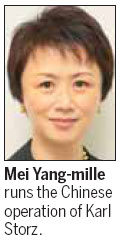Winning the talent wars

| College graduate students look for positions at a job fair held in Bozhou city, Anhui province, on Aug 18. Liu Qinli / for China Daily |

Companies urged to innovate to retain workforce and stay competitive
Despite receiving thousands of applications every month, Mei Yang-mille has been struggling to find the right talent to occupy some key positions in her company.
Yang-mille, who runs the Chinese operation of Karl Storz, the world's largest endoscope manufacturer, says that as a multinational company, it has no problem in attracting talented people but often finds it hard to recruit skilled and qualified personnel.
"There are people out there, but the number of 'A class players' seems to have got smaller," she says. "So we have to interview lots of people until we get the right ones."
Yang-mille says the problem has become worse as the company has expanded its operations in China to meet the growing demand for high-quality medical equipment in recent years.
Along with the booming medical device market fueled by strong demand from Chinese hospitals because of larger purchasing budgets and planned infrastructure upgrades, the German company has also had to increase its number of employees.
"There is a gap between supply and demand of qualified medical graduates and professionals," she says. "And it is unlikely that the gap will be filled in the next five to 10 years as the medical device market is booming in China."
Yang-mille was speaking at the company's China headquarters in Xujiahui, the central business district of Shanghai. The company, which has about 220 employees in China, also has bases in Beijing, Shenyang, Chengdu, Guangzhou and Hong Kong.
She says the entry barrier in the medical device market is very high and graduates from the Chinese education system often cannot cope with the global standards for medical talent.
"At the entry level, the graduates we need are those on the top of the pyramid," she says. "They should have comprehensive product knowledge and technical expertise and the capability to work with doctors and medical experts. But in China it is hard to find candidates who meet all the requirements."
Yang-mille says many Chinese graduates are not qualified because they are good at theory but do not know how to handle projects or work in a team.
"As many of them are from one-child families, they do have weaknesses in teamwork, critical thinking and analyzing ability," she says. "Compared with their peers in the US and Europe, Chinese graduates appear to be less mature at their age."
Yang-mille says she was astonished to find that a college graduate brought both of her parents to a job interview because she said she needed them by her side. "I've never seen this before, but clearly she will never grow up under the wings of her parents."
She admits that the good side of Chinese graduates is that they are hardworking, intelligent and willing to learn, which are the qualities needed for any industry.
Because of young graduates' lack of experience, she says, the company needs to recruit experienced medical professionals to fill mid-to-senior-level positions.
But fierce competition as multinationals poach from each other and a limited source of professionals are causing wage inflation and high turnover.
As a result, Yang-mille says, she has to invest in people to build an early pipeline, creating a culture of coaching, welcoming job rotation and internal promotion, as well as running a talent program for top performers.
She has introduced personality assessments into the hiring process and expanded the company's recruiting efforts beyond major universities, especially for highly skilled positions such as sales, logistics experts or technical personnel familiar with their products.
"We are quite open-minded in recruiting talent, which means we don't care whether they are from a certain top university or a less known college, as long as they are qualified for the position," she says, adding that they have three "I" standards to measure whether the candidate is suitable for the job - integrity, initiative and intelligence.
Of course, there is a danger that the money spent on developing talent could be lost if the employee decides to join a rival, a common problem in many emerging industries.
Yang-mille says she understands the threat well, and the company has been focusing on career development instead of relying on compensation packages, which is a good way to reduce staff turnover, but unsustainable in the long run.
"If an employee is staying in the company only because of an offer of a higher salary, he or she will eventually leave because of that," she says. "I think the most effective way to retain professionals is to care about their career path and guarantee them that there is no glass ceiling within the company."
Karl Storz offers a range of career development programs, such as rotating people, combined with regular assessments of employees to determine a suitable career direction.
According to a report by Business Monitor International, the Chinese medical device market is expected to expand by about 15 percent every year over the next five years, while medical device sales are forecast to reach $42.8 billion by 2019.
But a lack of qualified medical professionals may be a continuing drag on business performance in China's medical equipment industry, says Yang-mille, who plans to increase the number of recruits 15 to 20 percent annually for the next 10 years.
"An investment in staff training and development is a company's critical success factor," she says.
lvchang@chinadaily.com.cn
(China Daily 08/31/2012 page6)
Today's Top News
- China, US hold maritime safety talks in Hawaii as Beijing reiterates warnings on sovereignty
- China sends letter to UN over Japanese PM's remarks on Taiwan
- Chinese, Uzbek FMs hold second strategic dialogue
- G20 an opportunity to strengthen Sino-EU ties
- China, Africa foster shared food security
- Japan urged to take practical steps to honor its commitments to China































